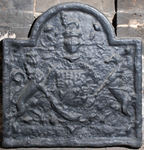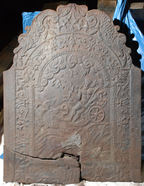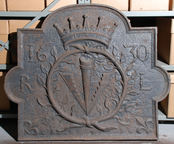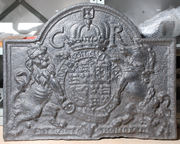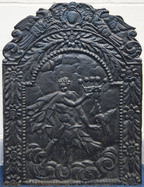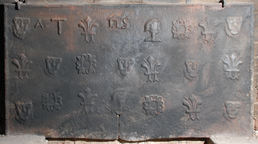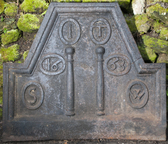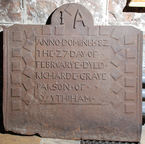-
794
Description: Arched rectangular shape; probable ovolo-moulded edging; Stuart royal arms of England (quarterly, 1st and 4th, France and England, 2nd Scotland and 3rd Ireland) with garter, crown, crest, motto and supporters.
Notes: A poor recasting, obscuring most of the detail.
Copies of this fireback are known.
Inscription: [illegible]
Arms: English Stuart royal
- Decoration tags:
- rectangular with round arch (shape)
- ovolo (edging)
- whole carved pattern
- armorial
- royal
Manufactured: in the 17th century in England.
Current location: Wickham Manor Farm, Winchelsea, East Sussex, England.
Museum number: NT/WMF/M/031 (part of the National Trust museum group)
- Attached to series:
- Stuart royal armorial firebacks
-
827
Description: Arched rectangular central panel with bead-and-pellet edging on a broad fillet; pictorial scene of a figure in a chariot drawn by birds, above a ground, and with clouds over; arched rectangular border with fillet edging; alternating acanthus leaves with symmetrical curled lines, possible initial centre bottom; on top, two mirrored sea serpents; plain extension panels to each side.
Notes: The figure is that of Jupiter, holding a bolt of lightning, who is sometimes portrayed in a chariot drawn by eagles; width without extension panels - 477mm.
Inscription: [?]N
- Decoration tags:
- 'Dutch' (shape)
- fillet (edging)
- whole carved pattern
- extension panels
- pictorial
- mythological
- monogram
- text
- animals
- humans
- objects
Manufactured: in the early-18th century in England.
Current location: Westgate, Winchester, Hampshire, England.
Museum number: WINCM:LH 5705 (part of the Winchester Museums museum group)
- Attached to series:
- British 'Dutch' style firebacks
- N series
-
588
Description: Arched rectangular shape with semi-circular protrusions at the sides; cavetto-moulded edging; a pheon (a downward-pointing arrow head barbed on the inner edge) within a wreath, an earl’s coronet above; the date on either side of the coronet; the initials on left and right sides; a fleur de lys in each bottom corner.
Notes: The detail of the wreath differs from that on the 1626 plate.
Copies of this fireback are known.
Inscription: 16 30 / R L
- Decoration tags:
- rectangular with round arch (shape)
- cavetto (edging)
- whole carved pattern
- heraldic
- text
- objects
Manufactured: in 1630 possibly at Robertsbridge Furnace, Salehurst in the Weald area of England.
Current location: Winchester Museums Store, Unit F2, Bar End Industrial Estate, Winchester, Hampshire, Winchester, Hampshire, England.
Museum number: WINCM:LH 5704 (part of the Winchester Museums museum group)
- Attached to series:
- Earl of Leicester series
- Personal firebacks
-
795
Description: Arched rectangular shape; cavetto-moulded edging; English royal Stuart shield, garter, crown, supporters and motto; initials split by crown.
Notes: The arches of the crown are not typically English in form, suggesting a possibly continental pattern-maker.
Inscription: C R / HONI SOIT QVI MAL ...PEN...
Arms: English Stuart royal
- Decoration tags:
- rectangular with round arch (shape)
- cavetto (edging)
- whole carved pattern
- armorial
- royal
- text
Manufactured: in the 17th century possibly in the Weald area of England.
Current location: Winchester Museums Store, Unit F2, Bar End Industrial Estate, Winchester, Hampshire, Winchester, Hampshire, England.
Museum number: WINCM:LH 3737 (part of the Winchester Museums museum group)
-
1092
Description: Arched rectangular central panel with bead edging; caped naked male figure standing on clouds, head turned over his right shoulder and holding a coronet of five raised baubles aloft in his right hand, on his left hand a bird perched, its wings displayed; above left a cloud; arched rectangular fillet border containing symmetrical, regularly-spaced 'daisy' flowers and festoons of leaves descending there from; on top of the arch, a central cartouche with a mirrored eagle and scrolls on each side.
Notes: The bottom panel of the border is missing, perhaps through breakage, the bottom flower on each side being incomplete and the fillet edging discontinued. The figure, which has yet to be identified, is probably iconic or mythological. The form of the arch suggests an English origin.
- Decoration tags:
- 'Dutch' (shape)
- fillet (edging)
- whole carved pattern
- allegorical
Manufactured: in the late-17th to early-18th century in England.
Current location: not known.
- Attached to series:
- British 'Dutch' style firebacks
-
962
Description: Arched rectangular shape; ovolo moulded edging; Tudor royal shield, garter, crown, motto and supporters (crowned lion and dragon); plain panels at sides and bottom.
Notes: A common variant has a rose and portcullis either side of the crown, and the top of the lion's crown and the dragon's ear do not overlap the edging; without the extension panels, the approximate dimensions of the main plate are 805mm wide by 590 high. The quality of the relief indicates that this composite fireback was created using an early casting of the armorial back.
Inscription: [Garter] HONI SOIT QVI MAL E PENSE / [motto] DIEV ET MON DROIT
Arms: Tudor royal
- Decoration tags:
- rectangular with round arch (shape)
- rope and wood moulding (edging)
- whole carved pattern
- composite
- planklines
- extension panels
- armorial
Manufactured: in the mid- to late-16th century in the Weald area of England.
Current location: in private hands, Wisborough Green, West Sussex, England.
-
797
Description: Rectangular; twisted rope edging (top and sides); three impressions of an ornate firedog, each incorporating lion’s legs, above it a pedestal with a lion’s head, surmounted by a caryatid, a shield shaped cartouche over its lower trunk, and with a floral vase headdress. The dog impressions are not evenly stamped, the middle one lying to the right.
Notes: The firedogs are much more elaborate than those customarily used as stamps on firebacks and indicate a later date; they probably included brass elements and were possibly French.
- Decoration tags:
- rectangular (shape)
- rope (edging)
- simple stamps
- objects
Manufactured: in the late-16th to early-17th century in the Weald area of England.
Current location: in private hands, Wisborough Green, West Sussex, England.
- Attached to series:
- Firedog stamp firebacks
- Metalware stamp firebacks
-
801
Description: Rectangular; twisted rope edging (top and sides); irregular arrangement of four stamps in three rows: face mask with ruff (7), flower head with four petals and leaflets (4), fleur-de-lys (7), and profile of head with ‘Roman’ crest (2); initials replace stamps top left and centre.
Notes: A smaller, dated variant is at Godolphin House, Helston.
Copies of this fireback are known.
Inscription: AT nS
- Decoration tags:
- rectangular (shape)
- rope (edging)
- carved stamps
- individual letters
- heraldic
- text
- humans
- plants
Manufactured: in the early-17th century in the Weald area of England.
Current location: The Dorset Arms, Withyham, East Sussex, England.
Citation: Lloyd, N., 1925, 'Domestic Ironwork I', Architectural Review, 58, pp. 58-67.
- Attached to series:
- Primitive stamp series
-
1061
Description: Triple-facetted arched rectangular shape; ovolo-moulded edging (top and sides); bottom centre, a vertical distaff or spindle repeated twice; to each side a fillet-edged oval containing the initials S and W; above, either side of the distaffs, two more ovals perpendicular to the first two, with the date split between them; above each distaff, an oval rotated as at the bottom, the initials I T split between them; at the base, a blank rectangular panel.
Notes: An unusual shaped fireback. It was recorded by J. Starkie Gardner in one of his scrapbooks (Victoria and Albert Museum, Archive of Art and Design (AAD/2014/8)), marked '[?]Warris Westerham Kent'; subsequently it was at Skipreed, Chiddingstone Hoath, Kent.
Inscription: I T / 16 63 / S W
- Decoration tags:
- rectangular with triple-facetted arch (shape)
- ovolo (edging)
- carved stamps
- text
- objects
Manufactured: in 1663 possibly in the Weald area of England.
Current location: not known.
- Attached to series:
- Miscellaneous stamp firebacks
- Spindle/distaff firebacks
-
798
Description: Arched rectangular shape with canted top corners; astragal-and-fillet and cavetto moulded strip on each side, angled at top; raised central square panel bearing main inscription in sans-serif characters justified to left (2s formed like Zs); irregular arrangement of small ‘serrated’ square stamps repeated 29 times in two vertical groups of 12 on each side of the inscription panel (6 on the outside, side to side, 6 on the inside, roughly corner to corner); 2 squares, side to side, below each side of the arch, above the inscription panel; 1 square at top of arch between non-matching initials.
Notes: The inscription is the same as on the iron plate above the grave of Richard Gray in Withyham church; another fireback, said to have the same inscription, was formerly at Wolvesey Palace, Winchester, and later in Winchester Museum, but is now missing; the moulding strips are likely to have been derived from furniture. Frances Ashbie and Richard Graye's godson, Richard, the son of William Ashbie, were among the beneficiaries of Richard Graye's will and the initials, IA, on the fireback may relate to another member of that family. The fireback was noted at Sompting, near Lancing, West Sussex, in the 1820s.
Inscription: I A / ANNO·DOMINI·1582 / THE·27·DAY·OF·· / FEBRVARYE·DYED· / RICHARDE·GRAYE / PARSON·OF· · / WYTHIHAM·
- Decoration tags:
- rectangular with round arch (shape)
- complex, furniture-derived (edging)
- carved stamps
- carved pattern panels
- individual letters
- text
Manufactured: in 1582 probably at Hamsell Furnace, Rotherfield in the Weald area of England.
Current location: St Michael's church, Withyham, East Sussex, England.
Citation: Arnold, F., 1871, 'Withyham Monumental Slab', Sussex Archaeological Collections, 23, pp. 320-1.
- Attached to series:
- Richard Graye inscription series
- Epitaph firebacks
